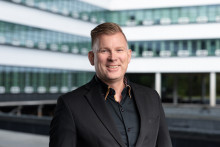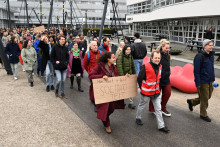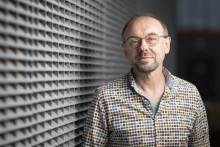You’re still in your old office?
‘I am, but it’s temporary. The role only officially starts in September, and then I’ll move. So at the moment I’m wrapping things up and having a lot of conversations. People think I won’t have time later, so they’re trying to sort the last matters with me now.’
From dismissal to the dean’s office, how does that affect you mentally?
‘Honestly, it feels like a liberation. It was dark for a while, but there’s a bit of sunshine again. It’s the closure of a difficult period. As I said in the earlier interview with U-Today, towards the end of last year, things were very uncertain. At the end of the day, it was clear: cuts had to be made, full stop. The fact that I too had to leave was, of course, very tough, but I never took it personally. That’s why I didn’t feel any resentment. It just so happens I’m at the age where you start reflecting on your future plans.’
And then came the vacancy…
‘As I said before, I’m a UT man through and through. I’ve built a lot here, and I still have so many ideas, both for the university and for its role in the region. I did have conversations with other organisations, but my heart lies here. So this was a golden opportunity, and of course I seized it. I already had ambitions in this direction, and I believe I have the skills and experience. The situation at TNW accelerated everything. Besides, I know this faculty inside out, and the people know me. From internal conversations, I sensed that there is support for me as dean. The transition from researcher to administrator is going smoothly. I’ve held management roles before, so I know what to expect and what the job entails.’
Earlier you said you want to practise empathetic leadership. What do you mean by that?
‘A lot has happened over the past six months. One point that could have been handled better — without pointing fingers — was communication, in two ways. On the one hand, people felt they were not being heard, and on the other hand, they felt insufficiently informed. Especially in a situation like we’ve just experienced, it would have helped if there had been more space and understanding for emotions. I’m a good listener, and I believe I have a clear style of communication. To create support for decisions — whether they’re popular or not — transparency is essential.’
In our last conversation you said you missed vision from the leadership. Now you’re in that position yourself. What is your vision?
‘That’s a fair question. I think we must not lose sight of our main goal, namely educating the academic professionals of the future and providing them with a solid foundation. We should focus on three core areas: chemistry, physics, and health. In addition to developing students, our work must contribute to societal challenges and the region’s economic development. I find it very important that people in the surrounding area understand what we’re doing here, and why it matters. I also want people to be able to talk with pride about their work at UT when they’re at a birthday party.’
Connecting with the region… In our previous conversation you mentioned ‘Bringing Textile Home to Twente’. Is that still on the agenda?
He sits up straighter. ‘Maybe not on the agenda, but definitely on the wish list. At UT, we’re doing fundamental research: looking at how nature solves problems and how we can replicate that. Spider silk, for instance, is strong and flexible. There are also groups of bacteria that store energy in fibrous structures. UT is uniquely equipped to come up with these kinds of biomaterials, which can be converted into textiles. This aligns perfectly with activities at Saxion, which can develop practical applications, creating a chain of collaboration and economic activity, with the ROC also involved. Research, processing, and production, all within Twente. And it fits beautifully with the region’s history. If there’s one project that captures the imagination, it’s this. I’m still very enthusiastic about it.’
Alongside your own dismissal, your entire research group was dissolved. Your brainchild, in a way. Do you never secretly think about reviving it?
He smiles. ‘The dissolution of the group is painful, but as dean I have a completely different role. I’m not going to re-establish groups or set up new research lines myself. But a good idea is a good idea, and I can, of course, share that with my colleagues in the departments. For now, we’re taking things slowly. But if someone comes up with something that fits within the faculty’s framework, we’ll explore the possibilities.’
From 1 September the role officially begins. What will the next six months look like?
‘The first period will mainly be about settling in and familiarising myself with the dossiers. It will also be about meeting lots of people. In the coming months, I want to work with the faculty to refine the vision for the years ahead, but also to address practical matters like establishing the departments’ ways of working. Every change brings resistance, so I want to take things step by step and involve people in the process. I also want to encourage healthy communication patterns, so there’s understanding and support for certain choices. Put simply, my main objective is to get the faculty back on track, restore calm, and ensure that people are proud to work at the university.’






